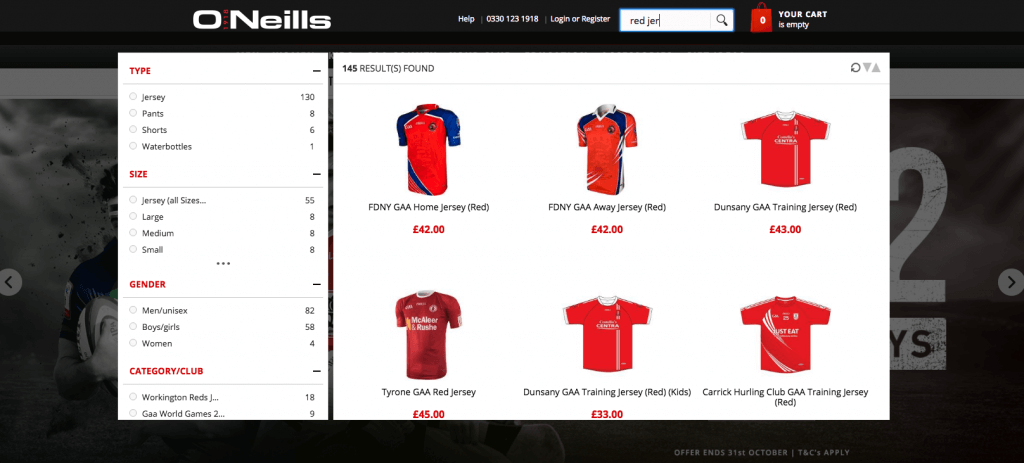The statistics for online retail in the UK continue to show substantial growth, with the average weekly online spend up to £931 million in September 2016, a rise of 22% from the previous September. With online spending accounting for just 15% of all retail spending, it’s clear that there is still huge scope for significant further growth in online shopping. As the leading eCommerce platform globally, it’s vital that Magento continues to innovate and refine its offering, to ensure that retailers can take advantage of that growth potential. One functional area, in particular that stands out as a big focus for lots of large merchants and a key weakness of the Community Edition and Enterprise Edition Magento platforms is on-site search.

In this article, we review how Magento’s site search stacks up, for both the Community Edition (CE) and the Enterprise Edition (EE). We also take a look at the latest developments in ecommerce site search, and evaluate some third-party solutions for improving Magento’s search capabilities.
Magento’s out-of-the-box search
Whilst the out-of-the-box (OOTB) search in Magento CE is definitely not the poorest performer within the platform market, there are nonetheless some significant hurdles that can compromise a positive customer experience. Common complaints, from Magento store owners and their customers alike, include the platform either returning thousands of irrelevant results or no results at all, even when you know categorically that the product is available in the store’s catalog. Magento can be brutal in its delivery of a zero results page, and offers little to no help in this scenario, other than suggesting that the customer tries again.
Many of these problems can be mitigated to some extent by correct setup of the search functionality and the product catalog. By default, Magento will take each single word in a search phrase and search for that word separately, which is why results can often appear to be somewhat random. Switching from the default search type of ‘Like’ to either ‘Fulltext’ or ‘Combined’ should improve results accuracy. You can read more on the benefits of this change here.
One OOTB feature of Magento’s search that sets it apart from some other eCommerce platforms is the ability to define synonyms. By analysing search terms used on a site, the owner can spot terms that should be returning results, but are in fact delivering the zero results page instead. If this is happening because of plural/singular mismatches or common misspellings,for example, the store owner can ‘fix’ the problem by defining a synonym, to ensure that the expected results are delivered in future. Used well, this is a powerful feature, but unfortunately, it can be time-consuming to keep on top of.
Magento also allows administrators to set up redirects to categories or CMS pages. For example, a search for ‘mens trousers’ could be redirected straight to the category ‘Mens Trousers’, and a search for ‘returns’ could be redirected straight to the CMS page where refunds and returns processing are documented. However, Magento falls short in that it doesn’t actually search CMS pages, for example blog content, user guides or customer support pages.
Magento Enterprise Edition does offer additional features over the search found in the CE edition, principally because it can be configured to use the Apache Solr search engine. With Solr enabled, Magento Enterprise Edition can offer search term correction, search suggestions, attribute weighting for improved relevance, and dramatic performance improvements. Magento 2.1x Enterprise Edition comes with further improvements as a result of them moving to using ElasticSearch (a more flexible, open-source framework), which, amongst other things, supports stop words and synonyms.
Both Community Edition and Enterprise Edition editions offer some basic search reporting capabilities, although, as with many of Magento’s OOTB reporting tools, these are somewhat limited and not designed to be administrator-friendly. It’s hoped that Magento’s recent acquisition of RJMetrics will lead to improvements in this area in due course.
It may seem that OOTB search in Magento (particularly with Magento 2 Enterprise) appears to be quite powerful, and indeed, if configured well and maintained regularly, it can produce reasonable results. However, if we start to examine some of the more recent innovations in the field of eCommerce site search, it soon becomes clear that many of the third-party alternative solutions have plenty of features that standard Magento search cannot match.
Recent trends in eCommerce site search
Site search started life as a keyword-driven system, and this is pretty much where Magento’s search has remained, along with many other eCommerce platforms. However, the latest generation of search engines has moved on, towards natural language processing (NLP). An NLP-driven search engine focuses on meaning rather than keywords, so it can deliver much more relevant result sets. NLP-based solutions also typically feature self-learning capabilities, to generate a continuously improving search tool.

As search engine algorithms have moved towards a more semantic approach, so supporting search tools have leaned towards improving the search journey and the customer experience. Additional developments include sophisticated faceted search (as per the above screenshot), which allows the customer to further refine a results-set, as well as things like content searching and custom weighting options, which allow administrators to boost specific categories, products or product attributes.
Third-party solutions
At some stage in the growth of an online retailer, the time comes to take action, in order to improve on-site search. Faced with a review of search term usage and performance, along with search journey analytics, looking at third-party alternatives soon becomes a priority. I’ve been working with Klevu for around a year, as a consultant, and I consider their product to be the best on the market.
Klevu is the leader in natural language processing and provides a lot of benefits in accuracy and auto-suggestions as a result. They also offer capabilities around self-learning results (auto-merchandised based on user behaviour and purchasing), advanced manual merchandising, automated catalog enrichment, a comprehensive reporting dashboard, rapid results, faceted search etc.
The third-party options for Magento search tend to fall into two groups – off-the-shelf extensions and enterprise-level solutions. In terms of simple extensions, Mirasvit’s Sphinx Search Ultimate is a popular choice for smaller merchants, offering auto-correct, dropdown auto-suggest, content searching and much more. As an affordable step towards a more powerful search tool, this extension is worth examining. Although, in most instances I’d suggest looking at a lower cost package from Klevu or Algolia, as they’re very competitive.
For those retailers with larger, more complex catalogs, however, an enterprise-grade solution, such as Klevu, is perhaps an appropriate choice. At its heart, Klevu has a powerful NLP-based engine that offers smart learning technology to deliver the most accurate results possible (as detailed above). With automatic addition of relevant synonyms, robust merchandising options, weighting, content searching, intelligent auto-suggest, solid search analytics and more, this type of enterprise search tool really sets the benchmark for eCommerce site search. Sitting outside of the Magento platform, with a plug and play interface, Klevu and other similar tools offer another benefit – there is no coding requirement and no potential for code conflicts with other extensions.
I started out using Klevu on my client’s stores before I ended up becoming a consultant for them and it delivered really strong results. You can see examples of how Klevu works on Oneills.com and Zimmermann.
Using search data to drive improvements
Whether you choose to stick with Magento’s native search tools, or you adopt one of the third-party search tools available, one thing remains constant. It’s vital that search analytics become a regular part of your online operations, and that staff at all levels are committed to that analytics process. Whilst the latest search tools may have self-learning features that enable them to improve your customer experience, they cannot highlight the external value of the search data mined. For example, manual analysis of search terms could identify new product lines that could be introduced to your store, or keyword streams for use in organic SEO efforts or PPC advertising campaigns. A smart search tool can do many things, but obviously the potential gains coming out of your search data stretch way beyond your store itself.
Users who perform a search will generally convert anywhere from 250% to 500% higher than users who don’t, which often highlights an opportunity around the increasing the prominence of your search function. This is another metric that should be factored into design / UX changes across your store (the same principle applies to things like layered navigation and product recommendation blocks).
Conclusion
It should be clear to retailers of all sizes that on-site search has the potential to deliver big results. As eCommerce itself grows up, customers are becoming ever more sophisticated in their shopping habits and ever more demanding in their expectations of online stores (particularly with merchants like Amazon eBay and John Lewis becoming more search-led and encouraging more sophisticated queries). Whether by working with Magento’s native search or by integrating a high-level alternative search tool, it’s in every retailer’s interest to work on improving their customer journey through fast, accurate and effective search.
2 Responses
Any thoughts on Klevu vs. Celebros / their respective relationships with Magento?
Hi,
Yes – I love Klevu, but I do also do consulting for them. That said, before I started working with Klevu, they were my primary recommendation for search because of their NLP and self-learning capabilities, as well their easy integration. I’ve got a number of large Magento clients that use Klevu and they love it – never seen one leave.
I know Celebros went for the partnership with Magento, but I’ve not actually worked with a merchant who used it – that said, from looking at their feature-set, it does look quite strong too. I know merchants get a lot of emails from Celebros / Magento as a result of being a partner – but I’ve not actually used it, so I can’t judge it really.